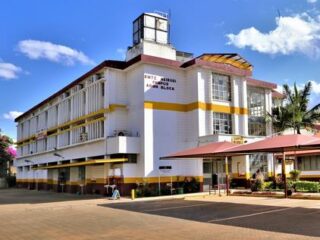GIS and Remote Sensing is one of the most marketable courses in Kenya. Most organizations dealing with research, data analysis and environment employ GIS specialists. When you possess a course in GIS and advanced skills in Data Analysis, you will certainly get a job. With a diploma in GIS,you will earn an average salary of Ksh 60,000.If you possess a degree in GIS,you will earn over Ksh 80,000 monthly. With a Masters course, you are guaranteed of Ksh 150,000 to Ksh 250,000 monthly salary.
Masters in GIS can be pursued by those possessing undergraduate degree in planning, statistics, Geography,Physics,Mathematics,Computer Science, Project Management or Monitoring and Evaluation.
Possible areas of employment, engagement and career advancement exist in sectors like the National government, county governments, international organizations, government parastatals, research organizations and the private sector (consultancies). Geography graduates have found jobs with international organisations such as United Nations Environment Programmeme (UNEP), UN- Habitat, United Nations Development Programmeme (UNDP), World Meteorological Organisation (WMO), National Aeronautics and Space Administration (NASA), Consultative Group in International Agricultural Research (CGIAR) centres, Inter-Governmental Authority on Development (IGAD), etc. Transport Geographers have found jobs with the World Health Organisation (WHO) where they work alongside the epidemiologists, while Agricultural Geographers have found jobs with FAO, IFAD among other Agricultural organisations. Geographers also work with International Organisations and NGOs involved in combating desertification and climate change
Institutions offering GIS and Remote Sensing courses in Kenya and admission requirements
UNIVERSITY OF NAIROBI
Master of Science in Geographic Information Systems
Entry Requirements
The common regulations for the Masters degrees in the University of Nairobi shall apply.
The following shall be eligible for admission:
- a) Holders of a Bachelor’s degree in any geoinformation related discipline with at least upper second class honours of the University of Nairobi, or equivalent qualifications from other institutions recognized by the Senate.
- b) Holders of a Bachelor’s degree in any geoinformation related discipline with at least lower second class honours of the University of Nairobi, or equivalent qualifications from other institutions recognized by the Senate, and two years experience in GIS.
- c) Holders of a Bachelor’s pass degree in any geoinformation related discipline of the University of Nairobi, or equivalent qualifications from other institutions recognized by the Senate, and five years experience in GIS.
Course Duration: 2 academic years
JKUAT
M.Sc. GIS & Remote Sensing
M.Sc. programme in GIS and Remote Sensing is a two year masters course which aims to offer sound training and research in Geographical Information Systems (GIS) and Renote Sensning. The course is tailored to suit various professionals in different field which use these two technologies as tools to aid in meeting their objectives.
Admission Requirements
The following shall be eligible for registration for the Master of Science in Environmental Information Systems:
(a) A holder of at least an upper second class honors Bachelors degree of JKUAT in
a spatial information based or associated field, OR
(b) A holder of at least a Second Class Honours (Upper Division), Bachelor of Science degree in relevant field, from any other institution recognized by the University Senate as being of equivalent academic status to (a) OR
(c) A holder of a Bachelor of Science degree of at least Second Class Honours (Upper Division), in a related field, which is recognized by the University Senate as an adequate pre-requisite for M.Sc. in Environmental Information Systems OR
(d) A holder of a Second Class Honours (Lower Division), Bachelor of Science degree from JKUAT or any other institution which is recognized by the University Senate as being of equivalent academic status and who in addition must show proof of either two years relevant experience and professional development or academic advancement through research and publication since graduation with the Bachelors degree or a Postgraduate Diploma in the relevant field.
(e) A holder of other qualifications recognized by JKUAT Senate as being equivalent to (a), (b) and (c).
(f) A holder of a JKUAT postgraduate Diploma in the corresponding area of specialization. Such candidate will be exempted from the course work part of the M.Sc. programme which he/she will already have covered under the postgraduate diploma programme
DEDAN KIMATHI UNIVERSITY OF TECHNOLOGY
Bachelor of Science in Geospatial Information Science and Remote Sensing
Entry Requirements.
- KCSE applicants: In the individual cluster subjects, a candidate must have at least the scores given below:
Cluster subjects
Mathematics C+ Physics C+ Physical Sciences B Geography C
or
Any group II, III, IV or V Biological Sciences Subject C+
Group IV Subject
Diploma applicants: A candidate must be a holder of a KNEC diploma in land surveying, geomatics, cartography, photogrammetry, remote sensing, or equivalent programme with at least a credit and one who had direct qualification for admission into the diploma programme.
Mode of Study: Full Time
Duration: 4 years
UIVERSITY OF NAIROBI
Bachelor of Science in Geospatial Engineering
Entry Requirements
F1 Candidates shall be eligible for admission into the Bachelor of Science
degree in the School of Engineering in the following categories.
-
a) KCSE Candidates
The basic admission requirement shall be the minimum requirement set for entry
into Public Universities which is a mean grade of at least C+ in Kenya Certificate
of Secondary Education (KCSE). In addition, candidates shall have obtained at
least C+ in each of the four cluster subjects from any of the following alternative
However, a cut-off grade higher than C+ in each cluster subject shall be
preferred if limitations of the number of places available for each degree
programme versus the number of qualified candidates so demand. The said cut-
off grades shall be determined and implemented by the School Board.
Alternative A:
Physics Biology or Geography or any Group IV Subject
Chemistry
Mathematics
Alternative B:
Physical Sciences Geography or any Group IV Subject
Biological Sciences
Mathematics
Group IV Subjects:
Home Science Building Construction
Art and Design Power Mechanics
Agriculture Electricity
Woodwork Drawing and Design
Metalwork Aviation Technology
- b) A-Level Candidates
Candidates with a minimum entry requirement of principal C passes in
Mathematics and Physics and a Subsidiary level pass in Chemistry with a credit
pass in English at ‘O’ level, except that for Geospatial Engineering, a subsidiary
level pass in Geography shall also be accepted in lieu of Chemistry.
- c) KNEC Higher National Diploma (HND) or Equivalent
Candidates with Higher National Diploma in the following broad areas of
study:
i) Agricultural Engineering
ii) Civil engineering
iii) Electrical engineering
iv) Mechanical engineering
v) Geospatial Engineering
vi) Any other approved subject area.
- d) Ordinary KNEC Diploma or equivalent (with credit pass)
- i) Agricultural Engineering
ii) Civil engineering
iii) Electrical engineering
iv) Mechanical engineering
v) Geospatial Engineering
vi) Any other approved subject area. - e) Diploma from Science/Technical Teacher Training Colleges
Candidates with a Diploma in Mathematics and Physics from recognized
teacher training colleges.
-
f) BSc/BEd (Science) degrees from Universities or any other relevant
degrees
Candidates with a Bachelor of Science or Education degree in Physics
and Mathematics from recognized institutions or any other relevant degree
from a recognized institution.
Exemption from any Courses in the Programme
-
a) The point of entry into the programme for candidates with a KNEC higher
national diploma or its equivalent in accordance with F1 (c) shall be in the
second year of study. -
b) The point of entry into the programme for candidates with an ordinary
KNEC diploma or its equivalent in accordance with F1 (d) shall be in the
first year of study. -
c) The point of entry into the programme for candidates with qualification
other than those outlined in F1 (a), F1 (b), F1 (c) and F1 (d) shall be
approved by Senate on the recommendations of the School Board of
Engineering and the College Academic Board and shall be based on the
qualifications of the applicant. -
d) Where a candidate wishes to be exempted from any course or courses,
he/she shall send a formal application to the Academic Registrar justifying
his/her request and attaching evidence of the credentials which support
such request. Such a candidate may be required to sit and pass an
exemption examination set and administered by the School, and approved
under the authority of the Senate after payment of a prescribed fee. -
e) Based on the assessment of the exemption examination, the School
Board of Engineering shall make its recommendations to the Senate. The
Academic Registrar shall communicate to the candidate, the Senate’s
JKUAT
B.Sc Geospatial Information Science
Admission Requirements
In addition to university and faculty of engineering common regulations the following requirements should be fulfilled by prospective candidates:
1) Kenya Certificate of Secondary Education (KCSE) applicants should satisfy all the requirements below:
- A candidate must have a mean aggregate of at least grade C+ (plus);
- The mean grade for the total score in the four cluster subjects must be at least C+ (plus);
- In the individual cluster subjects, a candidate must have at least the scores given below:
| Alternative A | Alternative B |
| Mathematics C+ | Mathematics C+ |
| Physics C+ | Physical Sciences B |
| Chemistry C+ | Biological Sciences C+ |
| Geography or Biology, or C+ | Geography or any C+ |
| Any Group IV Subjects | Group IV Subjects |
2) Kenya Advanced Certificate of Education (KACE) or the A-level equivalent should satisfy all the requirements below:
- At least two principal passes in Mathematics and Physics;
- At least a total score of nine (9) points at the KACE or equivalent;
- At least a credit pass in chemistry at the KCE or its equivalent.
3) Diploma applicants:
A candidate must be a holder of JKUAT diploma with at least a credit pass in the relevant discipline.
4) A holder of other qualifications recognized by the Senate as equivalent to 1, 2 and 3 above.
KENYA INSTITUTE OF SURVEYING AND MAPPING
Diploma and Higher Diploma in Photogrammetry and Remote Sensing
Diploma and Higher Diploma in Photogrammetry and Remote Sensing
Course duration: Three (3) years Diploma, Two (2) years higher Diploma
Examining body: The Kenya National examination Council (KNEC) / TVETCDACC
Syllabus: Approved by the Kenya Institute of Curriculum Development (KICD).
Course Commencement: September every year
Minimum Course entry requirements
Diploma: KCSE C- aggregate or KCE division II or equivalent qualification
with C- in mathematics, English and physics/Physical Science.
Higher Diploma: Diploma in Photogrammetry & Remote sensing or any other equivalent qualification
Apart from the trainees two core subjects i.e. Photogrammetry and Remote Sensing, the trainees of this course are also taught common and trade support subjects i.e. Communication Skills, Social studies, Entrepreneurship, Management, Land survey, Cartography, Mathematics, Physics and Geography
TECHNICAL UNIVERSITY OF KENYA
DIPLOMA IN TECHNOLOGY: GEO-INFORMATION TECHNOLOGY
| Requirements
• KCSE Mean Grade C (Plain) with C- (minus) in Maths, C Physics and Geography OR Certificate in Land Surveying or Cartography |
|||||||||||||||||||||
| Part III – Approximate Fees & Projected Study Schedule | |||||||||||||||||||||
|
DEDAN KIMATHI UNIVERSITY OF TECHNOLOGY
Msc. In Geospatial Information Systems/Geomatics
Entryrequirements
A holder of at least a second-Class Honors (upper division), Bachelor Degree from DeKUT in spatial information based or related specialization or from any other institution recognized by the university senate as being of equivalent academic status.
OR
A holder of a second class honors (lower division) ,Bachelor of Science Degree from DeKUT in a spatial information based or related specialization or of any other institution which is recognized by the university senate as being of equivalent academic status and who in addition has had either two years relevant experience and professional development or academic advancement through research and publication since graduation with Bachelor Degree or a postgraduate Diploma in the relevant fields as recognized by the university Senate
MASENO UNIVERSITY
Bachelor of Science in Geospatial Information Science with IT
Admission Requirements
University Admission Requirements for the Program
Minimum university entrance requirements
KCSE Mean grade C+ and mean grade for a total score in the four cluster subjects of at least B- and C+ in Mathematics/Physics, and Geography
OR
Candidates with A LEVEL OR EQUIVALENT should have a minimum of two (2) principal passes and at least a subsidiary level pass in Geography.
OR
A Diploma in Surveying, Cartography, GIS, and/or Remote Sensing
Credit Transfer
- Where a candidate wishes to transfer credit for course or courses of study, such candidate shall make a written formal application to the Academic Registrar justifying the request and attaching evidence of the credentials which support such request. Such a candidate may be required to sit and pass an exemption examination set and administered by the School’s Board and approved under the authority of the Senate.
- Based on the assessment of the credit transfer request the Board of the School of Planning & Architecture shall make its recommendation to the Senate. On approval of such recommendation by Senate, the School shall communicate the decision of Senate to the candidate.
MAASAI MARA UNIVERSITY
Bachelor of Arts in Geography and Geospatial Techniques
Admission Requirements
Minimum University admission requirements
C+ for Kenya Certificate of Secondary Education (KCSE) holders
Other considerations for admission requirements
- 5 Credit for International General Certificate of Secondary Education (IGCSE) holders.
- Minimum of 24 out of 45 points for international Baccalaureate (IB) holders.
- Two (2) principal passes for “A” Levels qualifications holders.
- C in KCSE for recognized pre-University qualification holders or recognized diploma holders with minimum of credit C (2.50 on a scale of 4.00) from a recognized institution.
- Any other equivalence as determined by the Kenya National Examination Council

























